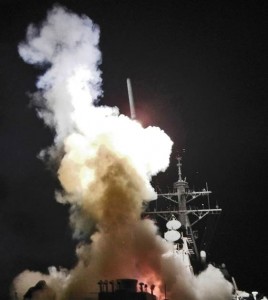Russia didn’t veto attack on Libya and now wants cease-fire
March 22, 2011
NationalJournal.com
March 22, 2011
In a stinging rebuke of U.S. policy in Libya, the Russian defense minister accused the U.S.-led coalition of killing Libyan civilians through errant air strikes and called for an immediate cease-fire on Tuesday. The comments drew a quick rebuke from visiting Defense Secretary Robert Gates, who said the Russian criticism was based on “outright lies.”
Speaking to reporters following an hourlong meeting with Gates, Russian Defense Minister Anatoly Serdyukov said Russia continued to support the United Nations resolution authorizing the creation of a no-fly zone over Libya but made clear that Moscow was increasingly uneasy about the escalating campaign.
“Unfortunately, recent developments in the country demonstrate that it is experiencing real hostilities, destroying civilian facilities, and the killing of civilians,” Serdyukov said. “This shouldn’t have been let to happen and we informed our U.S. counterparts of our opposition.”
Gates, in his own remarks, said the coalition was going out of its way to avoid civilian deaths, noting that most of the strikes have targeted Libyan defensive systems located far away from major population centers. Gates also said he expected major combat operations over Libya to taper off markedly within the next few days; he is the first senior American official to put any sort of timetable on the ongoing offensive there.
Gates fired back at the Russians shortly after departing the Ministry of Defense. Speaking to reporters in his hotel overlooking the Kremlin, the American defense chief said he was taken aback by the ferocity of the Russian criticism of the ongoing American-led military operations.
“I’m a little curious, frankly, about the tone that has been taken,” Gates said. “It’s perfectly evident that the vast majority, if not nearly all, civilian casualties have been inflicted by Qaddafi… and it’s almost as though some people here are taking at face value Qaddafi’s claims about the number of civilian casualties, which as far as I’m concerned are just outright lies.”
Gates’s comments were an implicit rebuke to Russian Prime Minister Vladimir Putin, who on Monday accused the U.S. of causing significant civilian casualties in Libya and likened the entire American-led operation there to a “crusade.”
That triggered an unusual public spat between Putin and his nominal ally and successor, President Dmitri Medvedev, about the country’s support for the U.S.-led military campaign against Libya. Medvedev fired back quickly, telling reporters was that Putin’s comments were “unacceptable.”
Russia had abstained in the U.N. Security Council vote that authorized members to take “all necessary measures,” including military force, to protect Libyan civilians from attacks by loyalists to Col. Muammar el-Qaddafi and enforce a no-fly zone.
American officials traveling with Gates said the two Russian leaders had probably been surprised by the scale and intensity of the allied bombing campaign inside Libya. But the U.S. officials said that, at least for the moment, they didn’t expect Russia to take steps aimed at bringing the conflict to a close.
Qaddafi-controlled media reported dozens of deaths by coalition airstrikes, while the U.S., France, and Britain reported Monday that they had no indications of civilian casualties.
“We have been very precise in our instructions to the air crews about what they may and may not do, and we are very, very conscious in… limiting civilian casualties,” said commander of the operation in Libya, Gen. Carter Ham, on Monday, adding that the missions to protect civilians will only be conducted with force “where we can safely without risk to other civilians and causing collateral damage.”
Coalition air forces from the U.S., France, Spain, Italy, Denmark, and the United Kingdom flew missions to sustain the no-fly zone over Benghazi to protect civilians from attack by regime ground forces and to conduct further reconnaissance, Ham said.

